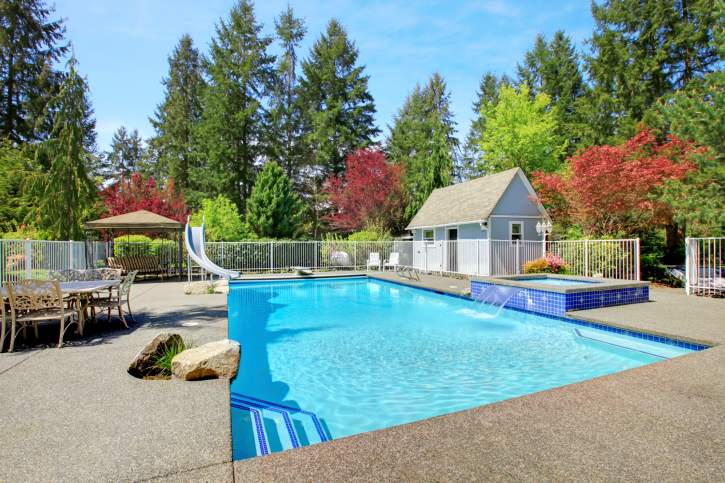
How to Kill Algae in Pool: Effective Strategies to Clean
Share
How to Kill Algae in Pool: Effective Strategies to Clean
Maintaining a sparkling blue pool can seem like an arduous task, especially when faced with the pesky problem of algae. Understanding how to kill algae in pool settings and exploring the science behind it can be fascinating for technology professionals and enthusiasts alike. This article not only provides strategies for effectively eliminating algae but also dives into how advanced technologies can help simplify your pool maintenance routine.

The Basics of Algae Growth in Pools
Algae are microscopic organisms that thrive in moist environments, making swimming pools an ideal habitat for them. Even the most technologically advanced pools can suffer from algae growth if the right conditions exist. Factors such as warm temperatures, sunlight, and inadequate chemical levels create a perfect storm for algae. Hence, understanding these basic factors is the first step in killing algae in your pool.
Understanding Different Types of Algae
There are various types of algae that can infiltrate your swimming pool, each requiring a distinct approach to vanquish. The main types include:
- Green Algae: Commonly found in pools, this type is easy to spot as it causes green water. It is less harmful but can quickly take over.
- Black Algae: This type is more resistant and sticks to pool surfaces. It can be quite challenging to remove, requiring special treatments. For more on black algae removal, check this linked article.
- Mustard Algae: This form of algae can be mistaken for dirt. It tends to form in shady areas and requires focused attention.
Each type presents its own challenges, making it crucial to identify the kind of algae present in your pool for appropriate treatment.

Effective Treatments for Alpabetic Killing
Now that we have discussed the various types of algae, let's delve into the treatments available to help you understand how to kill algae in your pool effectively.
Chlorination Techniques
Chlorine is the most widely used chemical for communal pool maintenance. Here's how it works:
- Shock Treatment: Shocking the pool involves adding a large dose of chlorine to kill existing algae. Aim to raise your chlorine levels to between 10 and 20 parts per million (ppm) to ensure its effective.
- Routine Chlorine Levels: Maintaining a consistent chlorine level between 1 and 3 ppm is crucial for ongoing algae prevention.
Monitoring your chlorine levels can be simplified using IoT devices, which can automate alerts for when levels drop or need adjustment. Learn more about chlorine amounts to maintain for optimal results.
Utilizing Pool Algaecides
For stubborn algae blooms, traditional methods might not be sufficient. Heres where algaecides come in:
- Copper-Based Algaecides: Best used for prevention, not as a primary treatment.
- Quaternary Ammonium Compounds: Effective against various algae types, including black algae.
Its essential to follow the manufacturer's instructions while using these chemicals. Always ensure that your pool is well-circulated to distribute the algaecide effectively.

Physical Cleanup Methods
Beyond chemicals, physical removal is necessary in many casesespecially for black algae.
Brushing and Vacuuming
Brushing the pool's walls and floor is crucial in dislodging algae from surfaces where it can thrive. Follow these steps:
- Use a stiff-bristled brush for best results.
- Vacuum dead algae and debris to prevent regrowth.
Dont forget to backwash your filter following the vacuuming session!
Robotic Pool Cleaners
For a more tech-savvy approach, robotic pool cleaners can offer an efficient way to automate the cleaning process. Investing in a smart robotic cleaner can save time and ensure consistent cleaning. For more on using pool vacuums, refer to this article on pool vacuums.

Prevention: The Best Strategy
Preventing algae is often more efficient than applying treatments. Here are some strategies for algae-free pools:
- Regular Monitoring: Test pool water weekly to maintain balanced chemical levels.
- Create Shadows: Use pool covers or landscape shade to limit sunlight exposure.
- Proper Filtration: Ensure your filtration system runs adequately, ideally for 8-12 hours a day.
All these prevention strategies contribute significantly to maintaining a clean pool. For more details on the cost of resurfacing your pool or upgrading maintenance systems, consider checking this resource: pool resurfacing costs.
Technological Advances in Pool Maintenance
Technology is changing the game for pool maintenance significantly. Automated systems can help reduce time and resources spent on cleanup. Consider these advancements:
- IOT Sensors: Real-time monitoring for chemical levels, temperature, and even algae detection.
- Automatic Pool Cleaners: As mentioned earlier, these devices can autonomously handle the cleaning processes.
- Smart Pool Management Apps: Apps that provide alerts and tips specifically tailored for your pool parameters.
For a further dive into such innovations, read about PoolX and IoT integration in pool maintenance.
Conclusion
When considering how to kill algae in your pool, a multi-faceted approach works best. Combining chemical treatments, physical cleaning, and technological advancements can keep your pool pristine throughout the season. Prevention should be your primary focus, while being informed about various methods will enable you to act swiftly against any algae issues that arise. Happy swimming and keep your pools clean and safe!
Frequently Asked Questions
1. How quickly can I see results after using algae treatment?
Results can vary depending on the severity of the algae bloom and the method used. Typically, chemical treatments can show visible improvements within 24-48 hours.
2. Is it safe to swim in a pool treated with algaecide?
Generally, it's recommended to wait at least 24 hours after treatment before swimming. Always follow the manufacturer's guidelines.
3. Can I use household bleach to kill algae in my pool?
Household bleach can kill algae, but it is not recommended due to issues with stabilizers and effectiveness compared to pool-grade chemicals.
As an Amazon Associate, I earn from qualifying purchases.
